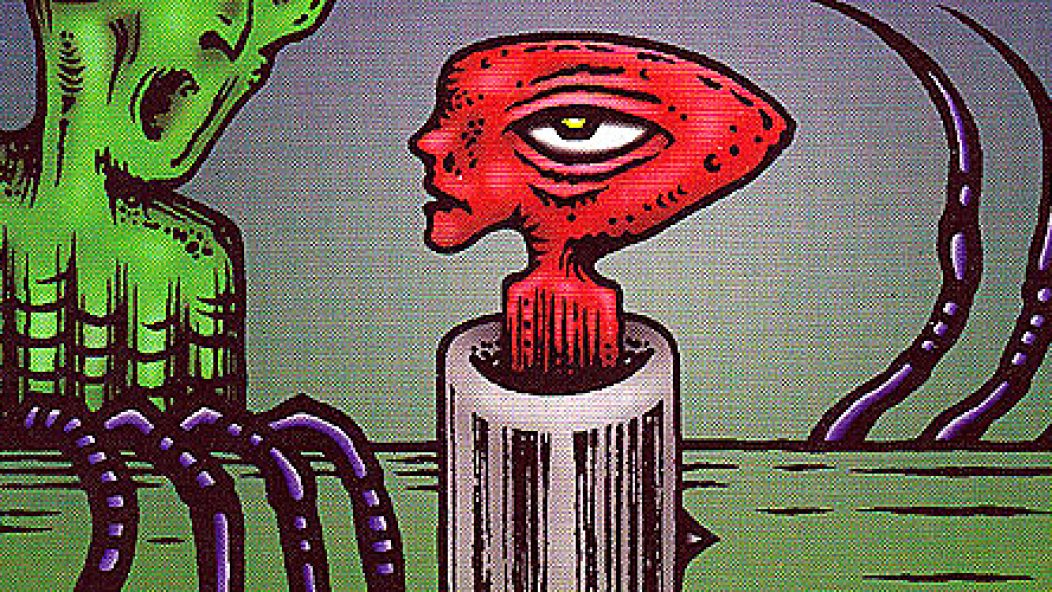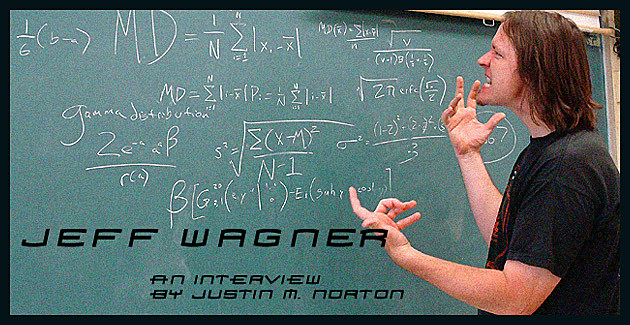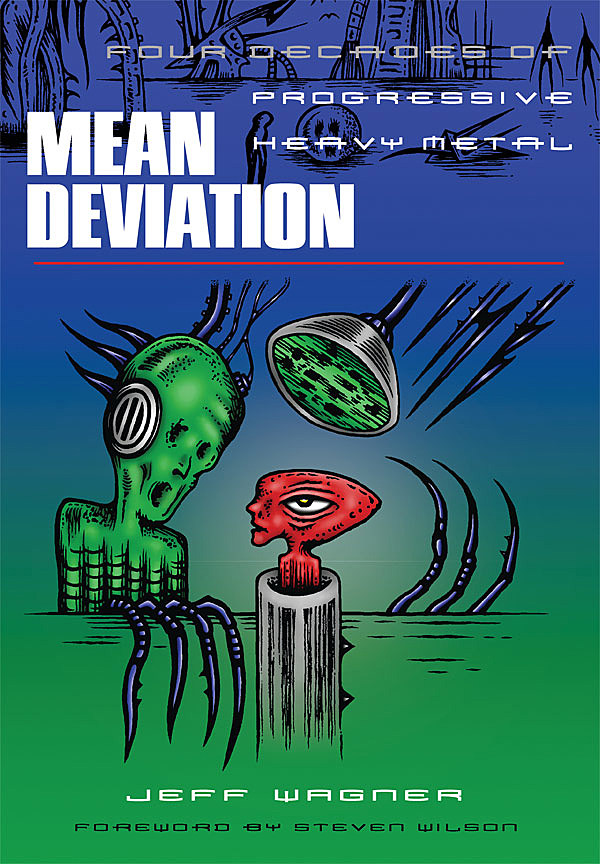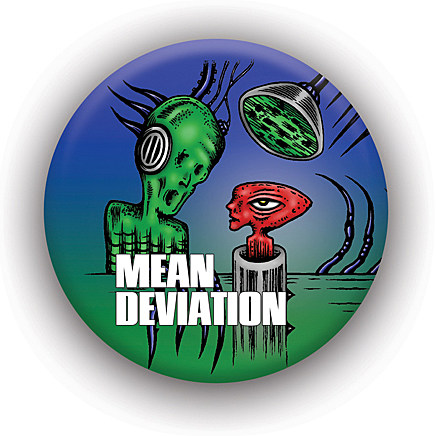
The Read Chord: Interview with Jeff Wagner
When metalheads think prog, they inevitably recite the following band names: Dream Theater, Fates Warning, Atheist, Cynic, and Opeth. (You could also throw in Chuck Schuldiner’s later work in Death.) Jeff Wagner, a former co-editor of Metal Maniacs and a newly minted author, argues that progressive music reaches much deeper into metal than the typical roll call. You don’t need to spin Cynic’s Focus to get your dose of prog; you can also find it in late ’70s Black Sabbath, Mercyful Fate, Celtic Frost, and even Mayhem. Wagner’s book Mean Deviation: Four Decades of Progressive Metal was released earlier this month by Bazillion Points. He spoke to us from his farm in southern Virginia, where he moved after quitting Metal Maniacs and the magazine business in 2001.
. . .
What was your gateway drug into progressive metal? Was it Voivod’s Angel Rat, which you mention early in Mean Deviation?
I wouldn’t say that was the gateway. That was more the album where a band that surprised you with every album surprised you in a way they never had before. That’s why Angel Rat is so significant to me. When I was a young kid just getting out of KISS, I found FM radio and Cheap Trick and Styx. Another band I found was Rush. I was heavily into Moving Pictures. If I had to name one of my favorite albums of all time, that’s it. But I dropped all rock once I discovered Judas Priest and Iron Maiden. Metal just became huge to me. I got into underground metal in 1983, and in about 1985, bands like Queensrÿche and Fates Warning took me back to the Moving Pictures era, except they were metal. That was probably the genesis of my interest in adventurous metal.
What about Rush appealed to you as a young listener?
The same things that appeal to me now. They are such good players, but even when they write 20-minute songs, they play to the strength of the song. They’re all about writing, even when there was showing off. I know people would disagree, but I can name a bunch of other bands that are bigger showoffs than Rush. Plus, I was 11 when the album came out, and I had never heard lyrics like that. It seemed so intellectual at the time. I listened to songs like “Vital Signs” and tried to figure out what they were about. Rush had this allure that they were operating on a higher level than their peers.
Rush has always been a divisive band in the same way that progressive metal has been divisive.
A lot of people say, “I would love Rush except for the vocals”. But if you look at Rush and progressive metal in a general sense, you are probably right. It’s a real love-or-hate sort of thing. Who knows why? Some people don’t like having their metal messed with. They like it direct. They like the roots. There’s nothing wrong with that. I just find some of those bands mundane.
But when you say prog metal, I don’t think it’s easy to say what that really means. That’s why I wrote the book. Prog is more about a wide variety of approaches and applications to metal than a particular style. There are people who love Dream Theater or Fates Warning that would hate Voivod or hate Opeth. There are people who like heavier, weirder bands and don’t like traditional prog metal.
. . .
Mercyful Fate – “Satan’s Fall”
http://www.youtube.com/watch?v=64FaAs8zRO0
. . .
There were some albums and songs in the book that surprised me, although I agree they have progressive elements. One of them is “Satan’s Fall” by Mercyful Fate from Melissa. You also have Mayhem’s Grand Declaration of War. Are you trying to cultivate a broader understanding of progressive metal?
“Satan’s Fall” is in there because a lot of bands like Fates Warning and Opeth and Cynic looked up to Mercyful Fate as a game-changing band. They wrote odd riffs. They used odd timing. That song was radical for the time. I don’t know if I think of them as progressive like some other folks. But since so many musicians name-dropped them as a major influence, it made sense to put them in.
As for Grand Declaration, I hope I never called Mayhem a prog metal band, and if I did, I’ll change it for the second printing. (Ed. note: He doesn’t.) But there’s no question that the album was more progressive than anything Dream Theater has ever done. I’m not trying to bag on Dream Theater. But Grand Declaration was a huge leap and hugely experimental album that turned a corner for their career and reputation like Celtic Frost’s Into the Pandemonium. They are very similar albums. It’s a nuts album. They were coming back with their first proper album after Euronymous died, and there were all these devotees, and all these people thought the album was blasphemy.
You can see some of those progressive elements in Ordo Ad Chao.
I would agree even though they are very different. If Mayhem had never done Ordo, I might have been hesitant to focus on them in that chapter. But Ordo is completely bizarre. I’ve listened to it about 20 times and don’t even have my head around it yet.
When did you decide to write the book?
I’ve wanted to write a book since I left Metal Maniacs in 2001. There were some book ideas going around, and I looked at contracts, but they fizzled for one reason or another. I always had this book in me. Ian Christe and I have been friends since the late ’90s, and he always hinted that I should write a book. When he formed Bazillion Points, it was easy to sell him my idea. I sent him an email when he sent a release about the publishing company. I said, “Congratulations, I know a writer who wants to do his prog metal book”. He got back to me very quickly and said, “I have an ISBN number with your name on it”. Then it was just a matter of an outline and a formal proposal to make sure it was something he wanted to invest in.
How did you handle researching and organizing the project?
Researching wasn’t that difficult, even if there is a lot in there. A lot was in my head – particularly who I should spotlight. I’ve been living this stuff forever, and I’ve been around it since 1994. I’ve absorbed more than the average person, which means I’m an uber-nerd. But the organization was just daunting. There were times where I thought I couldn’t do it. I have to thank Ian for helping me see through the maze.
What was the biggest challenge? It seems like most participants were willing to talk.
It wasn’t getting people to talk. The biggest band I approached was Rush. I wasn’t successful, but I found quotes I needed elsewhere and credited them. Again, I think it was organization. It had to cover such a wide span. To organize that and make it readable and make sense was difficult.
. . .
. . .
I spoke to Steve Flynn of Atheist a while ago. They released a spectacular comeback album Jupiter and are receiving a huge push two decades after their heyday. He said the band’s early days were terrible. What’s changed?
Bands like Atheist and Cynic were ahead of their time. That’s a cliché, but it’s true. I saw Atheist and Cynic open for Cannibal Corpse, and they were heckled. I was disheartened. But they were doing things so radical most people couldn’t make sense of it. Those bands probably broke up because of how they were treated. 15 years later, people discovered or rediscovered those albums. Now it all makes sense to people, and they are getting their due. Time caught up with them.
If you watch the recent Cannibal Corpse documentary, it’s evident how important Cynic was to them.
I was hanging out with Paul [Masvidal, of Cynic] in Los Angeles, and he had nothing but great things to say about Cannibal and Alex Webster. It’s too bad that fans back then weren’t the same way. Some were respectful, but there was a lot of division in the Florida death metal scene about some of that stuff.
Cannibal took a different turn with their sound around Gallery of Suicide.
They got more interesting musically. I think their early music is pretty much crap. I thought they were one of the weaker bands. Fast forward 15 years later, and they are putting out albums like Kill and The Wretched Spawn. Musically they really grew, and maybe part of that was listening to bands like Cynic. There’s no way you can be Cannibal Corpse and keep doing that and not have some degree of change or musical discovery.
Did you ever think there would be a genre called progressive death metal? All you had was Focus and Pestilence’s Spheres and a few other albums which weren’t understood.
Well, Spheres was hated. That didn’t even get the posthumous acclaim of Focus or Atheist’s albums. I think progressive death metal was so unlikely, but now it’s almost a legit genre. It’s a style and a sound now. Look at all the bands you can name-drop – Obscura, Necrophagist.
Punk rock was a reaction against what many viewed as the arena excess of ’70s, particularly Rush and Queen. Why were metalheads captivated by this when the punks hated it?
Boy, that’s a good question. I think metal fans like some measure of skill. Punk bands were about the raw, the gut, and the vibe. There is more of an acceptance of virtuosity among metal listeners. I’m no expert on punk, even though I’ve watched it from afar. So I’ll just give you a half-assed answer. (Laughs)
What you would consider progressive metal is a lot broader than what most people would expect.
I agree. My definition has always been vast. It just depends on how you define progressive. That’s why I put the Frank Zappa quote in the beginning. It says it all. That’s the line in the sand: “Without deviation from the norm, progress is not possible”.
By that logic, could you argue that a band like Brutal Truth that went far-out experimental on Need to Control has progressive elements?
You can. That’s the beauty of the tag. With a tag like Florida death metal or Swedish death metal, you know what it’s going to sound like. That’s a form. That’s a style. Progressive metal by my definition allows for the argument that Brutal Truth is progressive. If someone wrote a second book on progressive metal and put Brutal Truth in there, I’m not sure I would 100 percent agree, but I would understand. Something like “Godplayer” did things a grind band had never done.
I don’t know if you remember Pyogenesis, but they shifted radically from album to album. I didn’t focus on them, but someone could have written pages on them. That’s a way of saying the term “progressive metal” is wide open for interpretation.
. . .
Brutal Truth – “Godplayer”
http://www.youtube.com/watch?v=DIYeKZ7LElA
. . .
You put Celtic Frost squarely in the progressive metal category, at least for Into the Pandemonium. Why have people always used the term avant-garde metal to describe them?
When the album came out in 1987, the term “prog” wasn’t widely used. Voivod was also described as avant-garde thrash. Martin Ain is quoted in the book as saying he thought Voivod was avant-garde thrash. The only reason Celtic Frost is in the book is because of Into the Pandemonium. I don’t see them as a radically progressive band. If you look at how many musicians were influenced by that album, then they deserve to be in there. So I don’t think they were avoiding the tag. I just don’t think it was used.
You also defend Cold Lake, basically saying it allowed Tom Warrior to stay sane after the perplexed reactions to Into the Pandemonium and the business pressure.
I will defend him as an artist and a human being. People need to understand that Cold Lake was probably something he needed to do, something that was therapeutic for him. As far as moods go, you couldn’t have two more different albums than Pandemonium and Cold Lake. Cold Lake is this rocking, party album with song titles like “Dance Sleazy” and “Seduce Me Tonight”. I’m no big lover of that album. But I’ve always said [Tom G. Warrior] is a human being, and if he had major disappointments and major personal upheavals due to Into the Pandemonium, that is why Cold Lake happened.
I’ve often thought when people criticize Tom for Cold Lake that they don’t consider life’s challenges and disappointments. Everyone has something like a Cold Lake in their life. We just aren’t living in public.
That’s an awesome observation – hats off. When I think about Cold Lake, I think about Load. People need to consider the crazy changes and things that happen to people in the music business. Of course things change. I’m not defending Load as a piece of art. But I think a sellout for Metallica would have been to just say we’re going to go back to Kill ‘Em All. Cold Lake wasn’t a great album, but it was a necessary step. So be it.
A single bad book usually isn’t used to impugn a great writer’s entire canon.
I’m a huge Margaret Atwood fan. I read Cat’s Eye pretty recently, and it did nothing for me. I thought it was dull. Does it change how I feel about The Handmaid’s Tale? Hell no. Too many people want to do that to Tom Warrior for Cold Lake or to Lars and James for Load.
Do video games like Rock Star and Guitar Hero make progressive technical playing more accepted in metal?
I’ve only played Guitar Hero once, but I was terrible at it. You’re actually at an advantage if you’ve never played an instrument before. I’m not sure if it’s drawing people to progressive music. Is Dream Theater or anything available on that?
I’m not sure. I haven’t played the games.
I hope that kids out there into these video games do end up picking up an instrument. I remember the time I did play Guitar Hero. My friend’s son asked if I played an instrument. I said [that] I played bass and I was pretty good. And he said the game was harder than an actual instrument. Some kids have that mentality that this skill eclipses even playing an instrument.
. . .
Wagner on the influence of virtuosity on prog metallers
[audio: JEFFWAGNER_TALKS.mp3]
. . .
You called out Sabbath Bloody Sabbath as possibly the first progressive metal album. Was that in part because of [Yes member] Rick Wakeman’s keyboard playing? What other elements make it progressive?
You said “possible”, and that’s right. I wanted to throw it out there like a devil’s advocate. When it came out, progressive rock couldn’t have been bigger. Taking a long time to record a studio album was in vogue. Rick Wakeman’s part is small, and they used him for the wrong song. If you are going to use him, use him more prominently. Let him go crazy. There’s more progressive elements than the Rick Wakeman part. The arrangement of “National Acrobat” is progressive in that it doesn’t follow a verse-chorus-bridge-fade formula.
It’s definitely a huge change from the first album, which was a blues record.
They weren’t trying to be progressive, but I think they radically changed from album one to album eight. There were some radical steps. They couldn’t help but soak in some of the prog rock aesthetic of the time. It was the same era when prog was bigger than god. It reflected on Sabbath Bloody Sabbath and Sabotage.
Reading the book, I got the sense that you think musicians will stagnate unless they push into new and unexpected places. What do you think about the movement to restore old school death metal or people who just do the same thing? Is that the metal version of a John Grisham novel?
A John Grisham novel or AC/DC. But I’m not trying to ever come across as pejorative. There is a time and place for everything. I have a friend who thinks the last Bolt Thrower album is their greatest. I thought it refined everything they have done for the last four or five albums. I just find it kind of dull, as good as it might be compositionally. There is a lot of worth to a less-is-more approach. At the same time, less-is-more can be dull. It depends.
You were the co-editor of Metal Maniacs until right around the turn of the century. Were you surprised when the print edition closed in 2009?
No. They never had a publisher behind it to make it the magazine it could have been. We never got to apply a great layout like Decibel. It was always a pretty crappy-looking magazine. I can say that because I was there, and I banged my head against the wall so much trying to get it to look good. I thought the writing was good, and that everyone was contributing stuff we could be proud of. But print was already dying. Brave Words is gone, too.
Is the Internet the future for metal journalism and music writing, or does print have a future?
If I look at it realistically, I would say the Internet is the future. I hope enough people stick around that demand some physical products, whether it’s a magazine or a book or vinyl. But it seems that everything is going to the screen.
How did you go from editing a magazine to living on a farm in southern Virginia?
I had to leave Maniacs. I was frustrated. I loved the magazine gig. It was probably the best job I’ll ever have. But I had issues with the publishing company that grew so strong that I just felt I had to leave. I was tired of fighting for a better layout, for better distribution. I wanted to move somewhere and have a bigger house with more land. We couldn’t afford it in the New York/New Jersey area, so we looked south and found this great place. I just decided to make the leap. I thought I would find something, and it was one of the best decisions I ever made.
. . .
. . .
MEAN DEVIATION GIVEAWAY
aka Defend the Indefensible: Dream Theater
“What bothers me most about Dream Theater are the horrible lyrics, the vocals, and how most of their songs are less songs and more technical douchebaggery.” — A user on the IGN boards
We are giving away a signed copy of Mean Deviation to a brave soul who is willing to defend Dream Theater.
Such defenses can take any form – logic, passion, diagrams, musical examples. For a chance to win this book, defend Dream Theater in the comments box below. The best defense will win the book. International entrants are welcome. All defenses are due by midnight PST a week from today, Wednesday, January 5.
. . .
BUY MEAN DEVIATION
assuming that you don’t want to defend Dream Theater
Bazillion Points [free downloadable chapter available]
. . .














